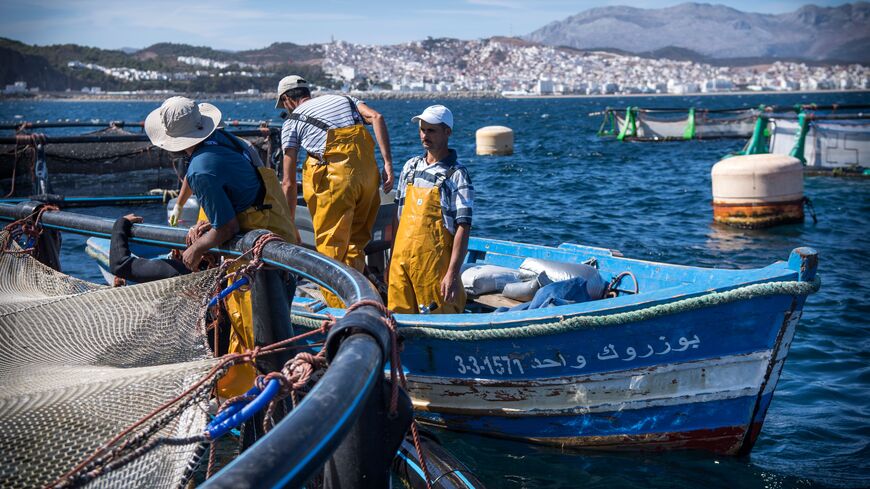The Sustainable Fisheries Partnership Agreement between Morocco and the European Union (EU) officially expired on July 17, threatening consequences on EU's relations with Rabat and hurting trade between the two sides .
The deal that had been in place for four years generated $233 million from the bloc to the Maghreb country, in return for licenses for EU fisheries off Morocco's coast.
The expiration and Rabat's refusal to renew is related to a decision by the General Court of the European Union in 2021 that annulled EU-Morocco trade deals covering farm products and fish, on the grounds that they were agreed to without the consent of the people of Western Sahara.
Morocco regards Western Sahara as its own, while Algeria-backed Polisario rebels have sought to establish an independent state there. Both the US and Israel have recognized Morocco's sovereignty over Western Sahara but the majority of European countries have declined to do so.
The major obstacle to renewal was an appeal made in December 2021 by the EU Commission and the European Council of the European Court Judgement (ECJ) decision to rule in favor of the Polisario Front, stating that the deal needed to be made with the consent of Sahara inhabitants.
The ECJ made its ruling in September 2021, which consequently caused the EU-Morocco fisheries agreement to become void from its expiration date, Lorena Stella Martini from the Rome office of the European Council on Foreign Relations told Al-Monitor.
The ECJ stated that the ruling did not go into force until the expiry date because “annulling [the agreement] with immediate effect could have serious consequences on the European Union’s external action and call into doubt legal certainty in respect to the international commitments to which it has agreed.”
In the ruling, the ECJ decided that the fisheries agreement had been made without the consent of Sahrawis residing in Western Sahara.
From the ECJ perspective, the Polisario Front is the only party able to communicate the consent of Sahrawis. In the court’s findings from Sept. 29, 2021, it reads, “The court determines that the applicant (Polisario) is recognized internationally as a representative of the people of Western Sahara, even if that recognition is confined to the self-determination process of that territory.”
Morocco rejects the Polisario’s claim of independence in Western Sahara, and the European Commission’s keen desire to continue deals with Morocco prompted the appeal of the ECJ ruling. The fate of the ECJ’s decision is expected to be given toward the end of 2023.
The current situation
A spokesperson from the EU Commission who anonymously spoke to Al-Monitor confirmed that there is currently no negotiation taking place between the parties regarding the fisheries agreement.
As the agreement has not been renewed, the “EU fleet cannot conduct fishing activities in the Exclusive Economic Zone (EEZ) of the third country concerned,” according to Article 31 (5) of the Regulation on the EU’s Common Fisheries Policy.
Morocco and the EU have engaged in fishery agreements since 1995. Under the previous deal that was last renewed in 2019, 128 EU vessels were permitted to fish in the Moroccan EEZ, including those from Spain, Portugal, France, Germany, Lithuania, Latvia, Poland, Netherlands, Ireland, Italy and the UK.
Despite the non-renewal, the spokesperson highlighted that the EU Commission is “carrying out a retrospective and prospective evaluation of the current protocol with Morocco to take stock of its application and identify the best way forward with Morocco.”
Martini said that in the case of a renewal, Morocco wants to negotiate terms with the EU to reach a more “advanced partnership with a clear-added value for Rabat.” The EU Commission reaffirmed to Al-Monitor in an email that “any decision will be taken jointly with our Moroccan partners in the shared interest of both parties.”
Consequences
The chance of the ECJ rejecting the Commission’s appeal is probable and will have a great political impact, Hugh Lovatt, the senior policy fellow with the Middle East and North Africa Program at the European Council on Foreign Relations, told Al-Monitor.
The root of the problem, which is bound to impact future relations between the EU and Morocco, is intertwined with the “legal logic” of not only the fisheries deal but also the preferential trade tariffs agreement, Lovatt stressed.
The trade agreement, which began in 2000, aimed to gradually eliminate tariffs over a period of 12 years on some agricultural products such as seafood, fruits and vegetables.
Similarly, the trade deal was also appealed by the Polisario and then annulled at the same time as the fisheries agreement by the ECJ in September 2021. The ECJ ruled in favor of the politico-military group as the court claims Morocco exports agricultural goods from Western Sahara to the EU without the consent of Sahrawis.
The underlying issue that connects these deals is that if the ECJ continuously rules in favor of the Polisario, Morocco and the EU will not be able to continue to engage in deals with ease.
Morocco’s stance on participating with countries that exclude Western Sahara was made abundantly clear in Moroccan King Mohammed VI’s speech on Aug. 20, 2022, on the occasion of the 69th anniversary of the Revolution of the King and the People.
The king emphasized, “The pivotal element in defending the Moroccanness of the Sahara is the unity of the domestic front and the full mobilization of all Moroccans — wherever they may be — to confront the plots of the enemies.”
Therefore, it is “highly unlikely that the king will ever accept the Polisario as a main interlocutor of the Sahrawi people” to facilitate deals between the EU and Morocco, Lovatt suggested.
If Morocco chooses to reject the ECJ’s decision for Sahrawis' consent, they could lose millions.
In 2020, exports of agricultural products derived from Western Sahara to the EU reached $86.5 million.
Ernesto Penas Lado, a former EU Commission official and expert on fishery topics, suggested to Al-Monitor that the only solution is for Morocco and the EU to “sign an agreement that excludes Western Sahara and insist on seeking a solution for this territory at the UN.”
Spain is expected to be hit hardest by the non-renewal as "most of the 128 EU trawlers fishing in Moroccan waters sail under the Spanish flag, with just a few flying German, French or Dutch flags," Deutsche Welle reported.








